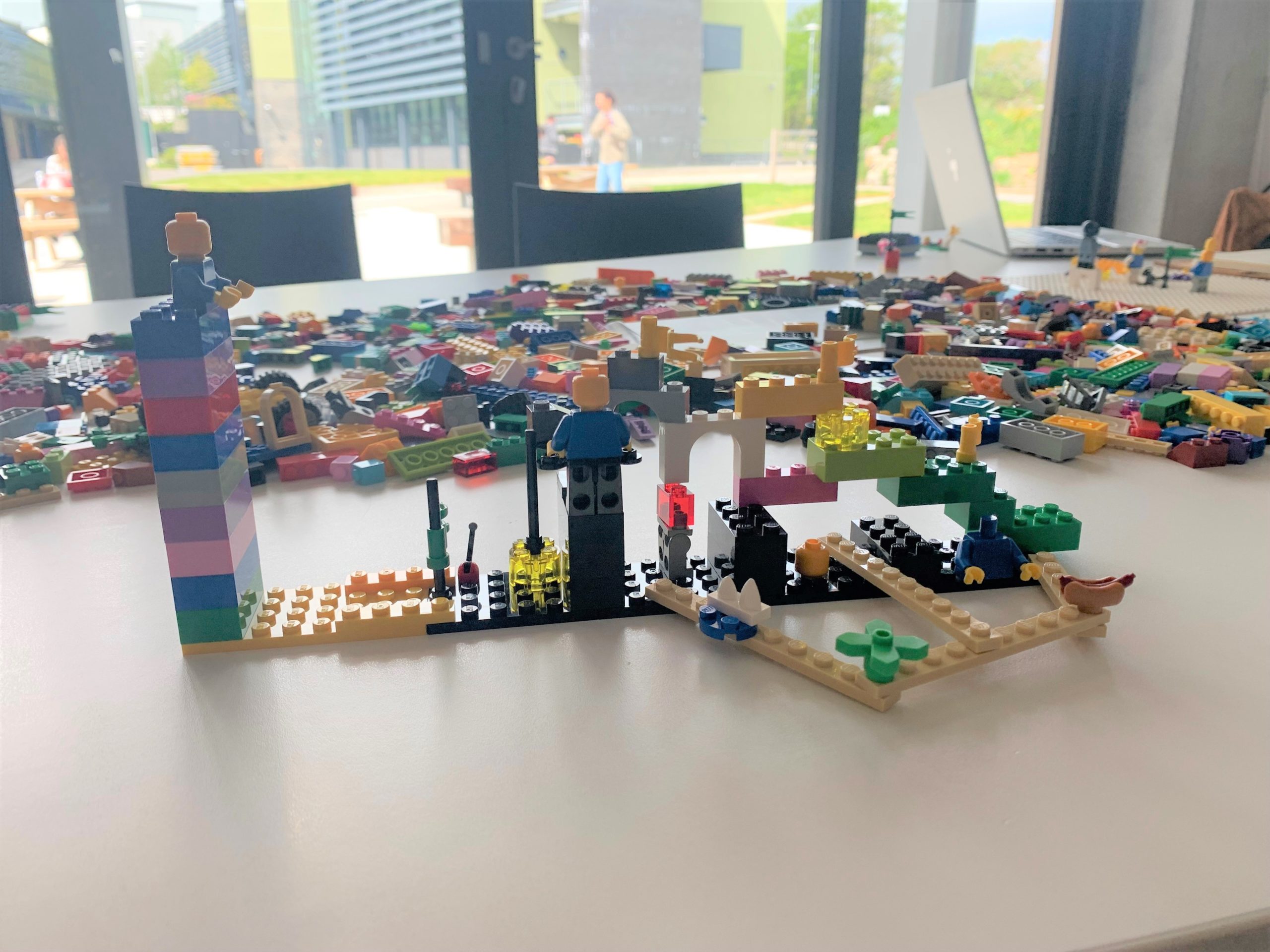Kelly Louise Preece is the Researcher Development Manager for PGRs and the Research and EDI Manager. You’ll recognise her face from workshops, her voice from WEBINARs, and her jokes from the 90s. You can follow her on twitter @Preece_Kelly and subscribe to her podcast for musings about researchers, development…and everything in between!
Last week myself and my job share, Kathryn Coombes, travelled to Penryn to run a couple of face-to-face Lego Serious Play sessions. For those who haven’t attended one of our LSP sessions yet, LSP is a problem-solving methodology, developed by Lego. It is, quite simply, a tool to think through and reflect on problems. We use LSP to deal with some of the more challenging and ephemeral aspects of the PGR experience – for example dealing with writer’s block and finding your way out of a rut.
During the Finding your way out of a rut using Lego Serious Play session we develop a shared ‘toolbox’ for overcoming challenges. The toolbox developed in our sessions last week was particularly useful, and so we wanted to share it here.
- Before you start – stop and reflect. Rather than just diving in, think about the problem or challenge ahead of you and what you might need to do to overcome it.
- At this point, you may also want to identify your goal or outcome to help you focus on the problem more clearly. This may be setting a deadline, a particular ‘output’ (a presentation, journal article, draft of a chapter) or the answer to a question or problem.
- Break it down. Whilst have a goal is important, goals are often big and unmanageable – and therefore demotivating. If your goal is to write a draft of a thesis chapter, break it down in to smaller tasks – reviewing your notes, making a plan, writing individual sections. Smaller tasks are more achievable, less intimidating and help motivate us. You can find some useful resources on this in our Project managing your research degree online resource.
- Do your research. Use your skills and do what you do best. If you are stuck in a rut – perhaps you are struggling for motivation after your upgrade – do your research. What strategies exist for maintaining motivation? Can you undertake any training to help? (Hint you can – it’s called maintaining momentum and focus after your upgrade and you can watch a recording of the session on Exeter Learning Environment or access our online resources.)
- Talk to other people. Chances are someone in your immediate circle, one of your peers, a postdoc in your department, or even a friend of family member has experienced something similar. Talk the problem through with them. Ask them how they overcame it. What strategies did they develop? They may have helpful solutions – but sometimes just talking through a problem can help you think through a problem or feel less alone.
- Use your supervisors. Their role isn’t to solve the problem for you, but it is to guide you. They have oversight and perspective on your project or work as an outsider. Use it. They have also likely been through similar experiences – ask them how they dealt with it.
- Get creative. We tend to work in set ways, which work for us most of the time. You might have a set strategy for planning a piece of written work, for instance. But what can you do when it doesn’t work – if you get stuck? Do it differently. Simple tools like mind mapping, using post it notes, or even playing with Lego can help you visualise a problem differently, think critically and creatively and come up with solutions.
- Rest. We tend to think the answer to productivity or overcoming a problem is to keep working at it. But it isn’t. We need rest to recharge our literal and metaphorical batteries, but also to let our ideas percolate. There’s a reason why we have our lightbulb moments when we are doing something else – our brains are processing the information and making connections subconsciously. So having rest, and taking breaks, is one of the most important tools in your box. Kay Guccione calls it #TakeBreaksMakeBreakthroughs.
- As well as rest, relax. Rest and relaxation are not the same thing – something I have learned the hard way! Engage in activities that nourish and energise you – going for a coffee with a friend, binging the latest Netflix phenomenon, walking, reading, cooking, cycling…whatever floats your boat. For me, its all forms of crafting (knitting, crochet, sewing, embroidery…) and building Lego.
- When it’s over – stop and reflect. We learn more in our personal and professional lives from when things go wrong than when they go right. When you have overcome that challenge or got out of that metaphorical rut, reflect. What happened? What strategies did you use to overcome it? How did you cope physical and emotionally? What helped you relax? Who did it really helped to talk to? Through reflection, you can refine your toolbox and build something bespoke to you.

With thanks to Raul Di La Fuento Pino, Hao Lu, Tanya Venture and Kathryn Coombes for the discussions and insights captured in this blog post.

